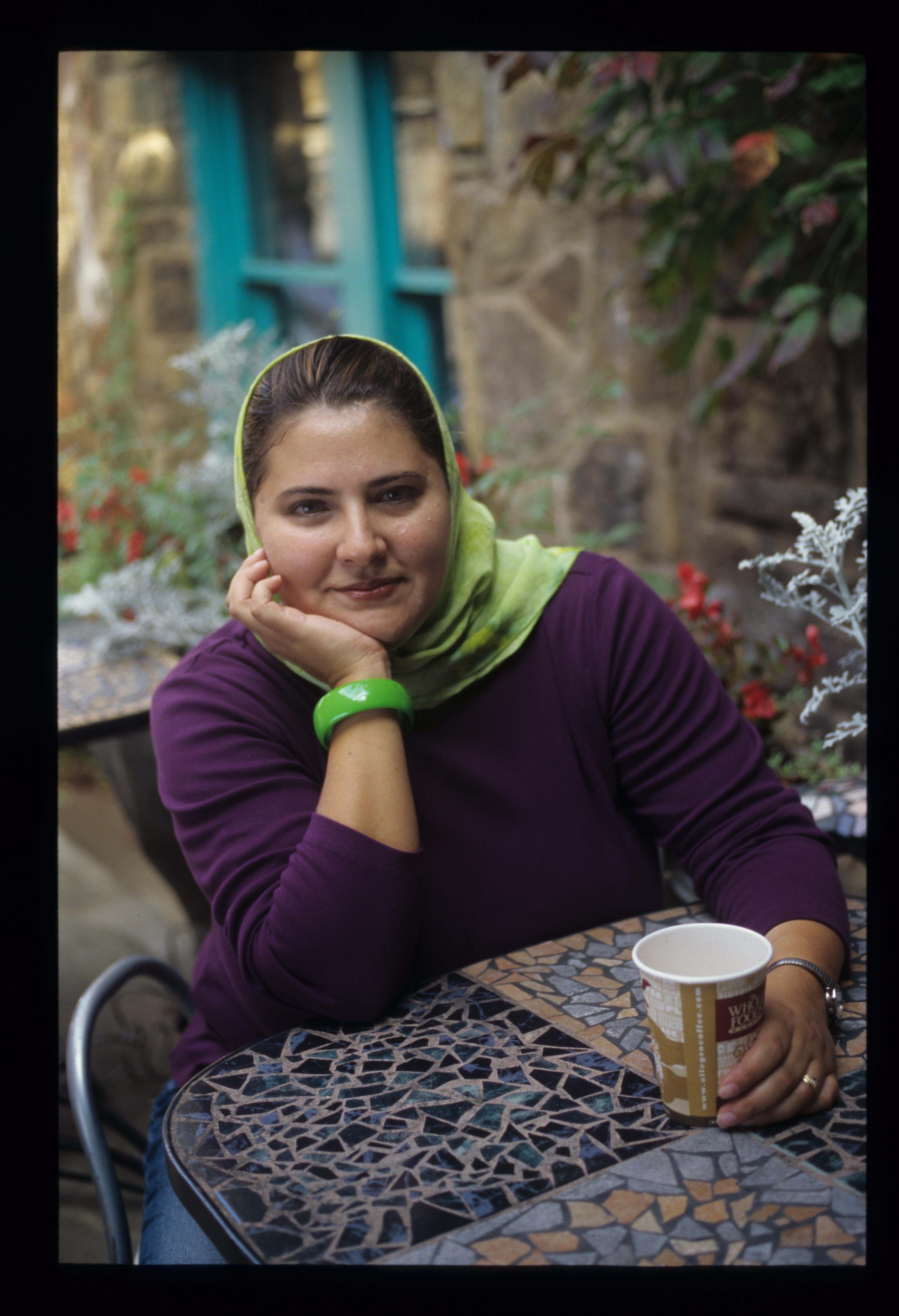A Woman True to Herself

Credit for photo of Mohja Kahf at Arsaga’s: Lorraine Chittock, PADIA, and Saudi Aramco World
FAYETTEVILLE, Ark. — In her first novel, The Girl in the Tangerine Scarf, Mohja Kahf, an associate professor of English at the University of Arkansas, immerses readers in the world of Khadra Shamy, who grows up in a devout Muslim family in the middle of Indiana.
“I wanted Americans to see their country through the eyes of these specific Muslim newcomers who have a pointed critique of mainstream American values,” Kahf said. “I wanted readers to be disoriented from their habitual view of themselves — in a friendly sort of way.
“At the same time, the novel also has Muslim characters who hold a lot of assumptions about Americans. By the end of the novel, many of those assumptions have been dismantled — for the reader, if not for all the Muslim characters.”
Although Kahf was born in Syria and spent some of her childhood in Indiana with her devoutly Muslim family, the novel is not primarily autobiographical. She pointed out two clear divergences. First, the author’s mother, who has “the sweetest temperament,” bears little resemblance to the fictional Khadra’s mother, an important figure in the novel. Second, in the real Indiana of Kahf’s time, “there were many more incidents of violence and vandalism” than could be included in the novel.
“Part of the original impetus for the novel was that I wanted my daughters to get a sense of the tight-knit community they missed — both the aunties and the uncles and the dark side,” Kahf said.
The fictional family and the aunties and uncles of the neighborhood are a cast of characters who nurture, challenge and aggravate the young Khadra, who grows during the course of the novel to become “a woman true to herself.” Kahf created some characters, such as the Syrian poet and the German professor, based on experiences in her own life, people “I had found because I needed them.” One of the warmest and most complex characters is Téta, who is the protagonist’s Syrian aunt and a composite of a number of women from the author’s life.
“Autobiography was a hamper I had to get away from for the story to work,” Kahf said. “I had to lift off and let the story become its own thing and tell a truth in a larger way.”
The author shows the adult Khadra Shamy using her art — photography — to convey a complex picture of Muslim lives. In one scene, she considers how best to photograph the familiar scene of a prayer hall and decides to use low camera angles to emphasize the experience of prayer.
“It is not the prayer she will photograph, not from the outside, but: what does the world look like from inside this prayer?”
Kahf said her novel also “invites discussion of where Muslims fit in the American religious landscape amongst Quakers, Catholics, the Amish, orthodox Jewry and others. It invites comparison between the recent immigration to this country of very observant Muslims and the history of Protestants who fled religious persecution in Europe to come to America.”
Within the novel are “secret embedded signals” pointing to other authors whom Kahf loves. Early on, “a caramel colored girl” with a bag of shoes is an echo from the Sandra Cisneros novel The House on Mango Street. One kindly individual in Indiana is the Quaker neighbor, Mrs. Moore. Her name comes from a character in E.M. Forster’s A Passage to India, “a tolerant elderly British woman who has an experience of interfaith grasping and understanding, and it unsettles her deeply.”
Kahf, who is on the faculty of the J. William Fulbright College of Arts and Sciences, has examined the lives of Muslim women in academic writings and in poetry. She is the author of Western Representations of the Muslim Woman: From Termagant to Odalisque and of E-mails from Scheherazad, which was a finalist in the 2004 Paterson Poetry Prize. She is at work on a collection of short stories and a novella based on her column, “Sex and the Ummah,” written for the online magazine Muslim Wakeup!
Contacts
Mohja Kahf, associate
professor, English
J. William Fulbright College of Arts and Sciences
(479) 575-5986, mkahf@uark.edu
Barbara Jaquish,
science and research communications officer
University
Relations
(479) 575-2683, jaquish@uark.edu
Headlines
PetSmart CEO J.K. Symancyk to Speak at Walton College Commencement
J.K. Symancyk is an alumnus of the Sam M. Walton College of Business and serves on the Dean’s Executive Advisory Board.
Faulkner Center, Arkansas PBS Partner to Screen Documentary 'Gospel'
The Faulkner Performing Arts Center will host a screening of Gospel, a documentary exploring the origin of Black spirituality through sermon and song, in partnership with Arkansas PBS at 7:30 p.m. Thursday, May 2.
UAPD Officers Mills and Edwards Honored With New Roles
Veterans of the U of A Police Department, Matt Mills has been promoted to assistant chief, and Crandall Edwards has been promoted to administrative captain.
Community Design Center's Greenway Urbanism Project Wins LIV Hospitality Design Award
"Greenway Urbanism" is one of six urban strategies proposed under the Framework Plan for Cherokee Village, a project that received funding through an Our Town grant from the National Endowment for the Arts.
Spring Bike Drive Refurbishes Old Bikes for New Students
All donated bikes will be given to Pedal It Forward, a local nonprofit that will refurbish your bike and return it to the U of A campus to be gifted to a student in need. Hundreds of students have already benefited.




